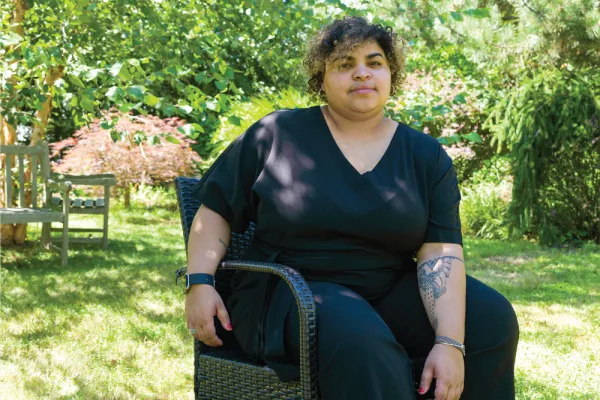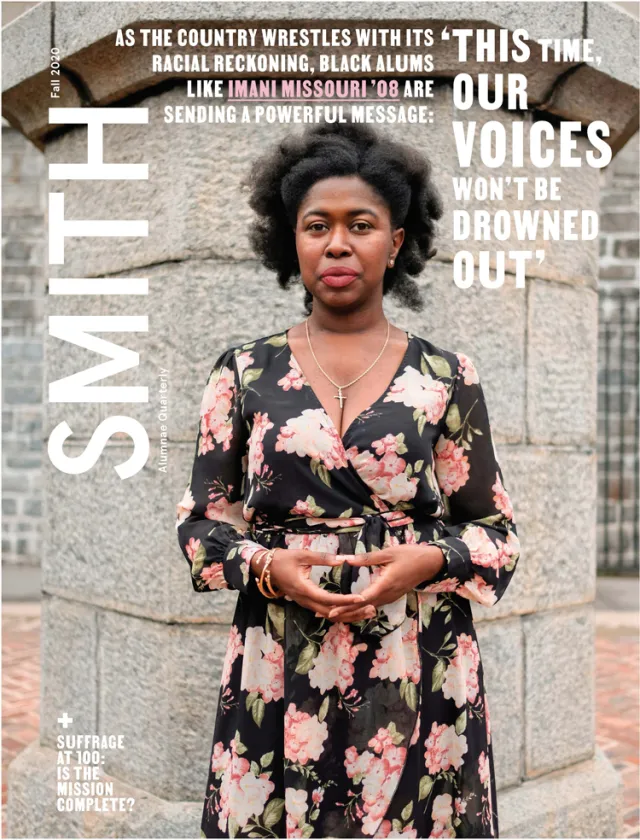We Must Demand More of Ourselves
Alum News
The struggle for true freedom builds through the generations. It’s our turn now.

Published September 21, 2020
In the weeks following the start of the national uprising in response to the murders of George Floyd, Breonna Taylor, Tony McDade and far too many others, my inbox was flooded with questions and requests. “What can I do?” “How are the youth looking at this?” “How do we teach them?” “How are we teaching ourselves?”
It was amazing to watch as more people started to ask these questions around racism and how they started to assess themselves at a heightened level. My excitement about people waking up to racism was mitigated by my frustration that they didn’t get there sooner. But my focus shifted quickly to how we could take advantage of this momentum. It’s a balance between being grateful that they have changed their thinking while acknowledging that there is hurt there.
Most of us, regardless of intention, have enacted harm on another person in a way that was likely racist. How we acknowledge that hurt, apologize and work through it in order to move forward, matters.
In a letter to his nephew in The Fire Next Time (1963), James Baldwin wrote, “Remember that: I know how black it looks today, for you. It looked bad that day, too, yes, we were trembling. We have not stopped trembling yet, but if we had not loved each other none of us would have survived. And now you must survive because we love you, and for the sake of your children and your children’s children.”
When I think about working toward a world where everyone is truly free, I think of the way liberation work has moved through generations. I think about all that my parents did to create an atmosphere where I had the privilege of being my authentic self, but more importantly the freedom to figure out who that self was. The quote from James Baldwin is one I use often when working with high school students. We use it as a framework to talk about the ways we move through the world, how it compares to generations before us and how we as a community will lay the groundwork for the generations that will come after.
Any work toward justice must happen with the collective power of an intergenerational community. Too often people say to me, “The youth are our future,” in a way that excuses their own learning. We put a lot of pressure on a younger generation to fix problems created by past generations. But millennials and Gen Z take on this pressure by redefining it, by demanding more than the bare minimum. They remind us that we must demand more of ourselves if we are ever going to have a world without racism and oppression.
Yet none of this would be possible without the foundation that was laid out for us. Our elders were once the youth who were determined to find a better way toward freedom. In honoring their work, there is much to learn about adaptability, about holding yourself accountable and realizing that we must learn about ourselves before we can truly bring a community together.
In my sophomore year at Smith, I took a class with Jennifer Guglielmo, associate professor of history; she was my introduction to what it looked like when a teacher focused less on the kind of student you were and more on the kind of person you wanted to become. She pushed us to think about our own survival and how the survival of those before us would lead the way. Her class on immigration and migration led me to get involved with the Organization for Undocumented Students Rights (OUSR) group on campus. We had many goals, but our main one was to have Smith change its policy to admit undocumented students as domestic instead of international. We organized, we met with students from Freedom University in Georgia, we protested around campus, we sat down with the chief diversity officer, we had teach-ins and we built on the work of Smith students who came before us. About three months after I graduated in 2016, we learned that Smith would change its policy on admitting undocumented students and would give them substantial financial aid support. It was the first time in my life that I saw community work and action lead to a policy change.
When I’m with the students who participate in my leadership program, I am reminded of my time with OUSR and sitting in Professor Guglielmo’s classroom. Just because the youth are our future does not mean that my generation and the ones before me get to shirk responsibility for change. It’s easy to focus on what this generation must accomplish, but for many of us the most important thing to decide is what we do next as an immediate step.
We must take advantage of this moment individually and collectively and ask ourselves: What do we need to do now so that police violence and the systems that uphold it don’t continue to take lives? How do we combat racism on a daily basis? Once we have the answer, we must be willing to actually do it. If this is to be a pivotal moment, it’s up to us. For the sake of our children, and our children’s children.
Ariana Quiñones ’16 is the next gen and racial justice coordinator for YWCA White Plains & Central Westchester, a proud Puerto Rican and an optimistic millennial. They wholeheartedly believe in the hope for a better and safer world.
This story appears in the Fall 2020 issue of the Smith Alumnae Quarterly.

‘A Better Way Toward Freedom’
Cries for justice, equality and an end to systemic racism rang out in cities large and small this summer following the tragic deaths—many at the hands of police officers—of Black and brown people, including George Floyd, Ahmaud Arbery, Breonna Taylor and too many before them. The country’s racial reckoning was a long time coming; in the months since the marches began, activists, politicians, scholars and other leaders have asked, What’s next and how do we keep the momentum going? On the pages that follow, we hear from four alumnae who are, in various ways, on the front lines of the anti-racism movement about the difficult—but hopeful—road ahead.
Here, alums on the front lines of the anti-racism movement weigh in on the difficult—but hopeful—road ahead.
This Is Not a Drill: White women must use their privilege in support of Black liberation. By Imani Missouri ’08
Raising Anti-Racist Children: Talking openly about difference makes it easier to discuss race. By Marietta Harvey Collins ’79, M.S.W. ’83
Feeding a Revolution: Gaïana Joseph ’17 brings food to social justice demonstrators—and food security to underrepresented communities.
Photograph by Kay Hickman